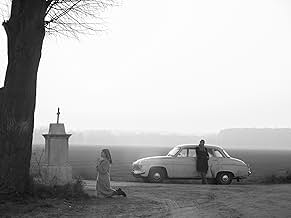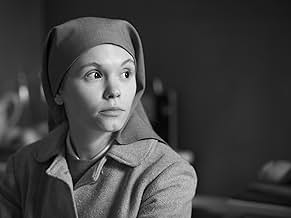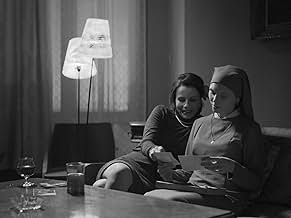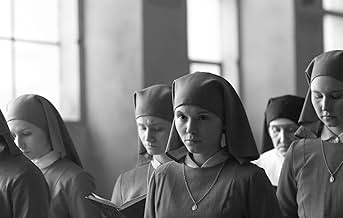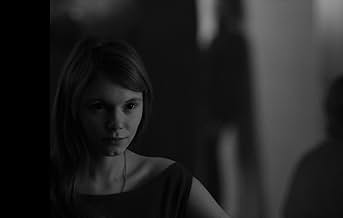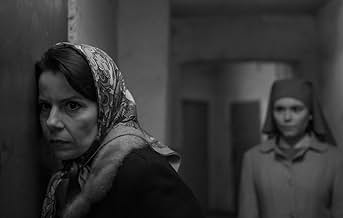IMDb रेटिंग
7.4/10
62 हज़ार
आपकी रेटिंग
अपनी भाषा में प्लॉट जोड़ेंA novice nun about to take her vows uncovers a family secret dating back to the German occupation.A novice nun about to take her vows uncovers a family secret dating back to the German occupation.A novice nun about to take her vows uncovers a family secret dating back to the German occupation.
- निर्देशक
- लेखक
- स्टार
- 1 ऑस्कर जीते
- 70 जीत और कुल 92 नामांकन
Natalia Lange
- Bronia
- (as Natalia Lagiewczyk)
Jan Wojciech Poradowski
- Father Andrew
- (as Jan Wociech Poradowski)
फ़ीचर्ड समीक्षाएं
Ida is magnificent, it will stay with me a long time. The narrative is powerfully compelling and yet if it had been a non-narrative film I would have been spellbound by the images alone. They should make a coffee table book of stills from it. Huge emotional issues are dealt with in a remarkably understated, unsentimental, but appropriate way. The use of music (often my pet peeve in these days of Hollywood formula) is enlightened and illustrative. I don't think the ending is ambiguous, I'm not sure the writer who wrote that understood it. Perhaps there is something slightly facile about the way things wrap up in the last 15 minutes of the film, but this is only in comparison with how beautifully they are laid out before that. Enough, this is not really a review, it is an exhortation - Go see Ida!
In the 60's Poland, a few days before pronouncing her vows of poverty, chastity and obedience to end her probation period and officially become a nun, Anna, an orphaned young woman, learns by chance the existence of her aunt, Wanda. The Mother Superior propose to Anna to meet Wanda. In this respect, she offers her to take all the necessary time. This encounter will turn her life upside down, via a journey of self-discovery and a road trip through rural Poland, in search of lost time. Lost forever...
Shot in gorgeous black and white, this film is a disconcerting beauty while remaining simple and pure, with a neat photography, elegant and appropriate framings highlighting the emptiness and the sadness of certain existences, and a careful treatment of natural light. Then, the two main actresses, Agata Kulesza and Agata Trzebuchowska, are prodigious and complement each other wonderfully. Finally, the script is excellently and soberly written, and, even if the film is hard and deals with an unpleasant subject, the staging is simple and anything but egghead. As a synthesis, the film is a masterpiece.
Shot in gorgeous black and white, this film is a disconcerting beauty while remaining simple and pure, with a neat photography, elegant and appropriate framings highlighting the emptiness and the sadness of certain existences, and a careful treatment of natural light. Then, the two main actresses, Agata Kulesza and Agata Trzebuchowska, are prodigious and complement each other wonderfully. Finally, the script is excellently and soberly written, and, even if the film is hard and deals with an unpleasant subject, the staging is simple and anything but egghead. As a synthesis, the film is a masterpiece.
Greetings again from the darkness. Writer/director Pawel Pawlikowski films in his homeland of Poland and presents a familiar topic from a most unusual perspective. This film has been very well received on the festival circuit and it's easy to see why: it's beautifully photographed, very well acted, includes terrific music and presents an emotional story for intelligent viewers.
We first meet Anna as a novitiate nun on the verge of taking her vows. Her Mother Superior has one requirement. Anna must visit her lone surviving relative. Her Aunt Wanda is everything Anna is not: worldly, cynical, direct. In the first few minutes of their visit, Wanda (Agata Kulesza) informs Anna (Agata Trzebuchowska) that she was born Jewish with the name Ida, and she was sent to a Catholic orphanage when her parents were killed.
After this bombshell, the two set out on a journey to discover the truth and trace their roots. It's a journey of discovery not just for Ida, but also for Wanda, who carries her own burden. Questioning one's faith and one's true identity is nothing new, but this makes for quite an unusual buddy road trip. Wanda is rarely without a drink in hand and Ida has had no previous exposure to the real world.
This is the debut of Agata Trzebuchowska and her porcelain look and big eyes convey a quality with which we find ourselves comfortable with, while Ms. Kulesza evokes empathy from the viewer despite her harsh edge and beaten down outlook on life and people. Hers is a standout performance.
Two exceptional pieces of music are used to perfection: Coltraine's "Naima" and Mozart's "Jupiter" symphony. The storytelling and look of the film might be austere (stunning black and white photography) but this music hits us hard in two separate scenes.
We first meet Anna as a novitiate nun on the verge of taking her vows. Her Mother Superior has one requirement. Anna must visit her lone surviving relative. Her Aunt Wanda is everything Anna is not: worldly, cynical, direct. In the first few minutes of their visit, Wanda (Agata Kulesza) informs Anna (Agata Trzebuchowska) that she was born Jewish with the name Ida, and she was sent to a Catholic orphanage when her parents were killed.
After this bombshell, the two set out on a journey to discover the truth and trace their roots. It's a journey of discovery not just for Ida, but also for Wanda, who carries her own burden. Questioning one's faith and one's true identity is nothing new, but this makes for quite an unusual buddy road trip. Wanda is rarely without a drink in hand and Ida has had no previous exposure to the real world.
This is the debut of Agata Trzebuchowska and her porcelain look and big eyes convey a quality with which we find ourselves comfortable with, while Ms. Kulesza evokes empathy from the viewer despite her harsh edge and beaten down outlook on life and people. Hers is a standout performance.
Two exceptional pieces of music are used to perfection: Coltraine's "Naima" and Mozart's "Jupiter" symphony. The storytelling and look of the film might be austere (stunning black and white photography) but this music hits us hard in two separate scenes.
simplicity, great photographs, splendid script. at first sigh, an old fashion movie. in fact, wise manner to use the legacy of impressive tradition and a great director who use, in same measure, with same precision, tension, poetry of images, atmosphere of period, cultural roots. it is a reflection occasion about origins, truth, faith and choices. a profound Polish story who reflects the identity search of an entire continent. it is , certainly, a rare gem. the cause is not only beauty of photography or admirable acting but a special flavor who remains after its end as a delicate feeling. a young woman and the courage to become here self. that is all. in skin of seductive music.
Whereas Jacques Rivette's despairing 'La Religieuse' had been shot in incongruously pretty sixties Eastmancolor, this laconic but wryly good-humoured female road movie - like Ingmar Bergman's Persona' - gains much of it's seductive visual impact from being shot in coolly glacial monochrome that looks like what you'd have got if Vermeer had worked in charcoal.
Similarly, like the Scandinavian good looks of Liv Ullman and Bibi Andersson in Bergman's film, 'Ida' is fascinating to watch throughout simply for the strong Polish features of Agata Kulesza as the chain-smoking 'Red Wanda' and the button eyes of Agata Trzebuchowska in the title role.
Similarly, like the Scandinavian good looks of Liv Ullman and Bibi Andersson in Bergman's film, 'Ida' is fascinating to watch throughout simply for the strong Polish features of Agata Kulesza as the chain-smoking 'Red Wanda' and the button eyes of Agata Trzebuchowska in the title role.
क्या आपको पता है
- ट्रिवियाPawel Pawlikowski had such difficulty finding an actress to play the titular character that he asked his friends to take secret photographs if they saw anyone who was in the right ballpark of the character. One of his friends, director Malgorzata Szumowska, saw Agata Trzebuchowska in a Warsaw café, took the picture and persuaded her to audition. She agreed to meet with Pawlikowski because she was a fan of his film My Summer of Love (2004).
- गूफ़When Ida is in a church, the priest seems to be getting ready to say Mass and we see a versus populum altar, which didn't become the norm until years later after Vatican II. The movie takes place in 1961 and the priest would have been saying Mass on the high altar.
- कनेक्शनFeatured in 72nd Golden Globe Awards (2015)
- साउंडट्रैकSerduszko puka w rytmie cha-cha
Music by Romuald Zylinski
Lyrics by Janusz Odrowaz-Wisniewski
Performed by Maria Koterbska
टॉप पसंद
रेटिंग देने के लिए साइन-इन करें और वैयक्तिकृत सुझावों के लिए वॉचलिस्ट करें
- How long is Ida?Alexa द्वारा संचालित
विवरण
बॉक्स ऑफ़िस
- बजट
- $10,00,000(अनुमानित)
- US और कनाडा में सकल
- $38,27,060
- US और कनाडा में पहले सप्ताह में कुल कमाई
- $55,438
- 4 मई 2014
- दुनिया भर में सकल
- $1,11,56,836
- चलने की अवधि
- 1 घं 22 मि(82 min)
- रंग
- ध्वनि मिश्रण
- पक्ष अनुपात
- 1.37 : 1
इस पेज में योगदान दें
किसी बदलाव का सुझाव दें या अनुपलब्ध कॉन्टेंट जोड़ें



